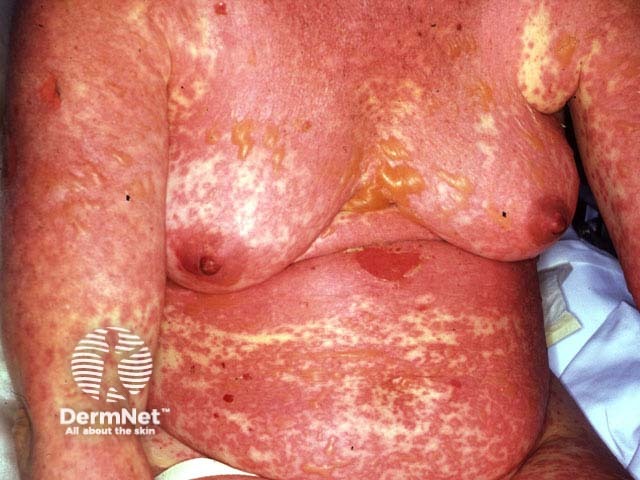Main menu
Common skin conditions

NEWS
Join DermNet PRO
Read more
Quick links
Cutaneous adverse reactions to medications are common; many are non-immunological in nature. This quiz considers some drug eruptions believed to be immunologically-mediated ('drug allergy'), or that are at least idiosyncratic in nature.
Often it is difficult to be certain whether a rash is due to drug, a skin disease or an underlying illness. A careful drug history is essential, considering prescription and over-the-counter medicines, topical agents, herbal remedies and supplements. Previous exposure, dose, duration and frequency of drug administration should be established. Refer to standard textbooks and obtain specialist advice from a dermatologist as necessary.
For each of the ten cases, study the image(s) and then answer the questions. You can click on the image to view a larger version if required.
Each case should take approximately 2 minutes to complete. There is a list of suggested further reading material at the end of the quiz.
When you finish the quiz, you can download a certificate.

Name this skin condition.
Toxic epidermal necrolysis due to carbamazepine
What are its clinical features?
Stevens Johnson syndrome (SJS or erythema multiforme major) and toxic epidermal necrolysis (TEN) are rare, potentially life threatening cytotoxic reactions. They are most often due to drugs. They present with marked systemic symptoms, painful skin lesions and mucosal ulceration. The disorders are arbitrarily distinguished by the degree of skin involvement. SJS characteristically presents with localised bullous target lesions; TEN presents with widespread painful red skin affecting more than 30-50% of the body. Full-thickness necrotic skin soon sloughs off and should be cared for like a deep thermal burn.
The patient should be admitted to hospital but medical management and intensive care may not prevent death from infection or overwhelming organ failure in up to 40% of cases.
List drugs that are commonly responsible.
If SJS or TEN is suspected, all new drugs should be stopped. Anticonvulsants, allopurinol, antiinflammatory agents, sulfonamides and other antibiotics are the most common causes but many drugs have rarely been reported to induce TEN.